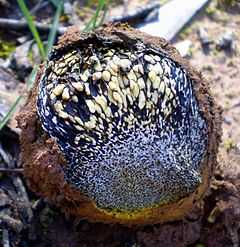Pisolithus
| Pisolithus | |
|---|---|
 | |
| Pisolithus arhizus | |
| Scientific classification | |
| Kingdom: | Fungi |
| Division: | Basidiomycota |
| Class: | Agaricomycetes |
| Order: | Boletales |
| Family: | Sclerodermataceae |
| Genus: | Pisolithus Alb. & Schwein. (1805) |
| Type species | |
| Pisolithus arhizus (Scop.) Rauschert (1959) | |
| Synonyms[1] | |
Pisolithus is a genus of fungi within the family Sclerodermataceae (suborder Sclerodermatineae).[2] The type species, P. arenarius, is now known to be synonymous with P. arhizus.[3]
Species
- Pisolithus abditus – Thailand[4]
- Pisolithus albus
- Pisolithus arhizus
- Pisolithus aurantioscabrosus
- Pisolithus australis
- Pisolithus calongei[5]
- Pisolithus capsulifer
- Pisolithus croceorrhizus[6]
- Pisolithus hypogaeus – Australia[7]
- Pisolithus indicus – India[8]
- Pisolithus kisslingii
- Pisolithus marmoratus
- Pisolithus microcarpus
- Pisolithus orientalis[9]
- Pisolithus pisiformis
References
- ↑ "Pisolithus Alb. & Schwein. 1805". MycoBank. International Mycological Association. Retrieved 2010-11-23.
- ↑ Binder M, Hibbett DS. (2006). "Molecular systematics and biological diversification of Boletales". Mycologia 98 (6): 971–81. doi:10.3852/mycologia.98.6.971. PMID 17486973.
- ↑ "Pisolithus arhizus (Scop.) Rauschert". Species Fungorum. CAB International. Retrieved 2010-11-23.
- ↑ Kanchanaprayudh J, Zhou Z, Yomyart S, Sihanonth P, Hogetsu T, Watling R. (2003). "A new species, Pisolithus abditus, an ectomycorrhizal fungus associated with dipterocarps in Thailand". Mycotaxon 88: 463–7.
- ↑ Martín MP, Durán F, Phosri C, Watling R. (2013). "A new species of Pisolithus from Spain". Mycotaxon 124: 149–54. doi:10.5248/124.149.
- ↑ Leonard PL, McMullan-Fisher SJM, Lebel T. (2013). "Pisolithus croceorrhizus P. Leonard & McMullan-Fisher sp nov from Queensland, Australia and New Caledonia" (PDF). Australasian Mycologist 31: 25–9.
- ↑ Thomas SR, Dunstan WA, Dell B, Trappe JM, Malajczuk N. (2003). "Pisolithus hypogaeus sp. nov.: a hypogeous representative of the genus Pisolithus from Western Australia". Mycotaxon 87: 405–10.
- ↑ Reddy MS, Singla S, Natarajan K, Senthilarasu G. (2005). "Pisolithus indicus, a new species of ectomycorrhizal fungus associated with Dipterocarps [corrected] in India". Mycologia 97 (4): 838–43. doi:10.3852/mycologia.97.4.838. PMID 16457353.
- ↑ Phosri C, Martin MP, Suwannasai N, Sihanonth P, Watling R. (2012). "Pisolithus: a new species from southeast Asia and a new combination". Mycotaxon 120: 195–208. doi:10.5248/120.195.